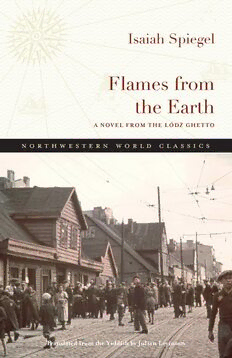
Flames from the Earth: A Novel from the Lódz Ghetto PDF
Preview Flames from the Earth: A Novel from the Lódz Ghetto
Flames from the Earth northwestern world classics Northwestern World Classics brings readers the world’s greatest literature. Th e series features essential new editions of well- known works, lesser- known books that merit reconsideration, and lost classics of fi ction, drama, and poetry. Insightful commentary and compelling new translations help readers discover the joy of outstanding writing fr om all regions of the world. Isaiah Spiegel Flames from the Earth A Novel from the Łódź Ghetto Translated from the Yiddish by Julian Levinson Northwestern University Press ✦ Evanston, Illinois Northwestern University Press www.nupress.northwestern.edu English translation copyright © 2023 by Northwestern University Press. Originally published in Yiddish in 1966 under the title Flamen fun der erd. Copyright © 1966 by Israel- Book Publishing House. All rights reserved. Printed in the United States of America 10 9 8 7 6 5 4 3 2 1 Library of Congress Cataloging- in- Publication Data Names: Spiegel, Isaiah, 1906– 1990, author. | Levinson, Julian, translator. Title: Flames from the earth : a novel from the Łódź ghetto / Isaiah Spiegel ; translated from the Yiddish by Julian Levinson. Other titles: Flamen fun der erd. English | Northwestern world classics. Description: Evanston, Illinois : Northwestern University Press, 2023. | Series: Northwestern world classics Identifi ers: LCCN 2022041769 | ISBN 9780810145573 (paperback) | ISBN 9780810145580 (cloth) | ISBN 9780810145597 (ebook) Subjects: LCSH: Holocaust, Jewish (1939– 1945)— Fiction. | Jews— Poland— Łódź— History— 20th century— Fiction. | Litzmannstadt– Getto (Łódź, Poland)— Fiction. | BISAC: FICTION / Jewish | LITERARY CRITICISM / European / Eastern (see also Russian & Former Soviet Union) | LCGFT: Novels. | Fiction. Classifi cation: LCC PJ5129.S6812 F513 2023 | DDC 839/.134— dc23/ eng/20221104 LC record available at https://lccn.loc.gov/2022041769 To my parents, Sarah- Gitel and Moshe, My sisters Clara, Miriam, and Iske, Murdered in Chelmno, Auschwitz, and Shtuthof 1941–1 944 Martyred — I.S. In memory of Maimon Obermayer (1916– 1939) — J.L. contents Translator’s Introduction ix Flames from the Earth 1 A Meeting in Snow 3 2 At the Bedside of the Dying 13 3 Th e Dead Stradivarius 19 4 Last Will and Testament 25 5 In the Darkness 33 6 On the Other Side 37 7 Th e Bell Ringer 45 8 Th e Stranger 51 9 In the Cellar 59 10 Black Birds 67 11 Purifying the Dead 75 12 Piles of Clothes 81 13 Th e Tower 89 14 Th e Rope 97 15 Secrets of the Mound 107 16 Bones 115 17 Th e Decree 121 18 Flames from the Earth 129 Translator’s Aft erword 133 Translator’s Acknowledgments 147 Books by Isaiah Spiegel 150 translator’s introduction As a writer, I have never really left the ghetto. I still see the people, the faces, the suff ering crowd . . . Th at whole period still lives inside of me like a dybbuk. — Isaiah Spiegel (1973) Isaiah Spiegel (1906– 1990) was one of the most beloved Yiddish writers to emerge from the Holocaust experience. He won nearly every major prize awarded to Yiddish writers, including the Inter- national Culture Congress Prize (1955), the Itsik Manger Prize for Yiddish Literature (1972), the Yankev Glatshteyn Prize (1977), and the Yiddish Writers Union Prize (1981). A two- volume collection of essays about his work was published to commemorate his eightieth birthday. His most devoted readers came from the global commu- nity we might call Yiddishland, with centers in Tel Aviv, Paris, New York, Johannesburg, Melbourne, and Buenos Aires. Nearly every- one in this dispersed world had been directly aff ected by the Nazi nightmare. Nearly all had restarted their lives in unfamiliar places aft er unimaginable losses, and for many, the Yiddish language itself had become their only true home. Th ese readers turned to Spie- gel’s writing to revisit the traumatic scenes of the Hitler years in the company of a trustworthy guide, someone who survived more than four years in the Łódź Ghetto, Auschwitz, and a work camp in Saxony— and who managed to transform his experiences into com- pelling works of literature. His writings are infused with symbolism, ornate metaphors, subtle irony, and beauty. As one of his earliest reviewers put it, “Spiegel is perhaps the only one who has given us the precious gift of the true ghetto-t ale, because he has solved the problem of organically combining the authenticity of facts with the power of a great tapestry.”1 Spiegel was embraced by his readers not so much because he told them things they did not know, but be- cause there was something reassuring, even uplift ing, in the way he shaped traumatic experiences into art. ✦ ix ✦
